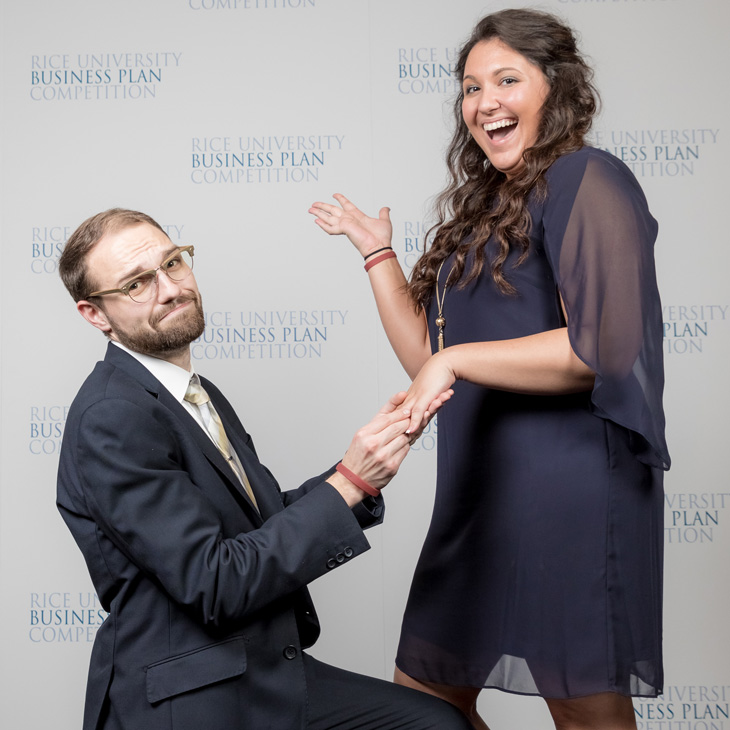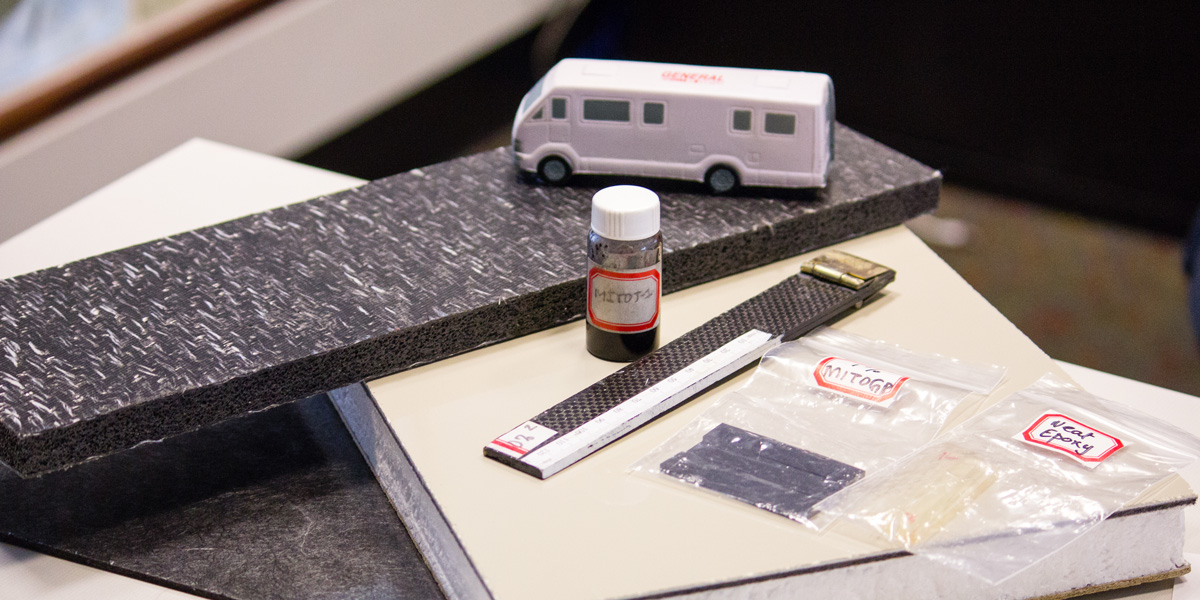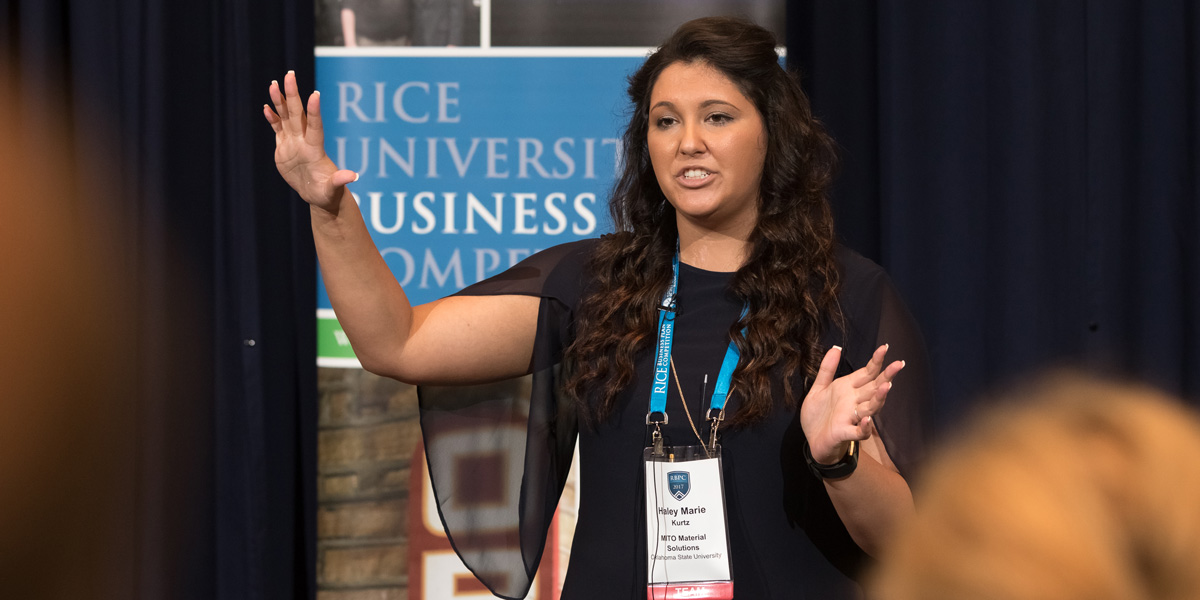On a Fast Track
By Ariel West
What started as a classroom project in the Creativity, Innovation and Entrepreneurship (CIE) Scholars Program ended up on the fast track to a successful business for Oklahoma State University students Haley and Kevin Keith.
Haley, an MBA student, applied for the CIE Scholars Program in fall 2015. The program, taught by Gajan, assistant professor of entrepreneurship in the OSU Spears School of Business, pairs MBA students with Science, Technology, Engineering and Mathematics (STEM) students to create a business plan for commercializing technology developed by OSU.
The OSU Technology Development Center presented several technologies to the student teams, and with her 10 years of experience in the recreational vehicle industry, Haley chose a technology called MITO to develop a business plan. Kevin, a mechanical engineering technology undergraduate, wasn’t enrolled in the class but helped Haley in what little free time he had.
“Haley, of course, was looking for scholarships, and she got into the CIE class,” Kevin says. “She picked the technology and came home that night and was like, ‘Hey Kevin, I picked this technology, I think it’s kinda cool, could be useful. I don’t know what it does though.’ She told me, and basically, she hit a gold mine.”
Little did she know her choice would lead her down a challenging yet rewarding path and change her life forever.
First Steps

After the CIE class ended, Haley and Kevin decided to continue working with MITO. They started working with Ranji Vaidyanathan, OSU-Tulsa professor of materials science and engineering, who had developed a nanoparticle additive composite that allows manufacturers to double the durability of composite materials utilized in the aerospace, recreation and automotive industries. The additive, which Haley has named MITO, was developed at the Helmerich Research Center in Tulsa.
To put that into perspective: if a Boeing 787 airplane were made completely out of MITO-infused composite, it would shed more than 48,000 pounds, saving airlines an estimated $480 million per airplane over 30 years.
“Ideas are a dime a dozen, but it’s not often that you find people to believe in your idea and take it forward, having the fire in the belly to stake everything for it,” Vaidyanathan says. “Haley and Kevin have staked their entire lives on the success of MITO, and it clearly shows.”
With her contacts in the RV industry, Haley began customer discovery interviews to uncover the potential market for MITO. She and Kevin interviewed more than 180 professionals from the composites and materials industry and learned that the original idea for MITO to be a spray application wasn’t quite what the market needed.
“Throughout the conversations, we learned that it would be better for the industry if [MITO] was infused right into the epoxy,” Haley says. “From there, we devised a strategy that was a business model that said we were going to sell directly to epoxy manufacturers and then market it to original equipment manufacturers that purchase the epoxy. That’s one of the valuable things the [CIE] class taught me, the value of an interview and what an industry professional would know.”
The team also continued to work closely with Gajan and moved into accelerateOSU, an entrepreneurial incubator program that houses student startup ventures and aims to leverage OSU and City of Stillwater resources to bring together business ideas. Gajan, who is also the director of the incubator, steered the team in the right direction and helped to refine their ideas. He would be a key adviser in what came next.
From Oklahoma to Nevada
Thirty pages of business plan later, the team, now named MITO Material Solutions, devised a plan that was viable. The members entered their first business plan competition, the Oklahoma Governor’s Cup, in April 2016 and began honing their pitch. They won $20,000 for first place in the High Growth Graduate Division, a huge validation that drove their passion to the next level. With an additional $2,000 from an interview award at the Governor’s Cup, the team also qualified for the Tri-State Competition in Las Vegas, which hosts teams from Oklahoma, Arkansas and Nevada.
They didn’t place at Tri-State, but Haley and Kevin weren’t fazed. They refined their business strategy, ran more tests and conducted more industry interviews. The Tri-State Competition became the only competition where MITO Material Solutions didn’t place.
“We learned a lot [at Tri-State]. We learned the value of knowing and rehearsing your pitch and knowing your financials in and out,” Haley says. “The judges thought that our idea was more of a licensing play. So we went back and took a look at our business model and strategy, contacted more customers and we said, ‘We add a lot of value to the commercialization approach that not many teams get to do in the chemical sector.’ We worked with Ranji again in the material science lab to do some more testing … and really explain what the market was telling us.”

On To More Contests
In February 2017, the team got into the Top 12 out of 166 teams and placed second at the Baylor Business New Venture Competition, winning $37,500 and marking a historic win for OSU. This competition was the most educational for MITO.
“It was just this pivotal point for MITO where we got this amazing coaching [from Baylor] all the way up until the competition,” Haley says. “When we got there, we did another coaching segment, and they ripped our pitch apart. They told us that we needed to add some new things, and to this day, there is one market strategy slide in our pitch deck that everybody has loved, and had Baylor not explained or told us to do it, we would have never known. It moved MITO forward.”
The team applied and was accepted for three more competitions: the Tulane Business Model Competition in New Orleans, the Rice Business Plan Competition in Houston, and the New Venture Competition at the University of Oregon. The team ended up turning down the Tulane competition to accept an invitation for the Venture Wells Stage Three grant program, a four-day, investment-ready workshop in Washington, D.C.
The workshop prepared the team for the Rice Business Plan Competition, the richest and largest business plan competition in the world. Haley and Kevin hired a lawyer and began better shaping their financial plan and defining their respective roles as the chief executive officer and chief operating officer of MITO Material Solutions. Out of 750 applicants, MITO made the cut for the Top 6.
“We walked in thinking, ‘Oh man, we are the complete underdog, there’s no way we’re gonna do that good,’” Kevin says. “We were editing our slides up to 15 minutes before the practice round, and we killed it. We gained a lot of traction with investors and potential customers.”
The first OSU team in the competition eventually won second place and $50,000. Haley also received the Courageous Women in Entrepreneurship award and Kevin placed fifth in the Mercury Fund Elevator Pitch Competition, adding $40,500 to their winnings.
“It was unlike any other competition,” Haley says. “Every single room had 50 judges in it or more, and people who are looking at you for certain awards and scoping you out for different things. I went there with the intention of getting the Courageous Women in Entrepreneurship award … and I chose that award because it was one of the big things. We were aiming for the top six, but I had no idea we would ever make it to the top two.”
Finally, it was time for the team’s last business plan competition, in Portland, Oregon. The smaller competition, hosting only 16 teams from all over the world, boasted a trade show component unfamiliar to the team. With MITO not being a consumer product, the pair had to get creative with how to present the nanoparticle additive composite as a business-to-business product housed inside another product.
The pitch competition was an open forum with 45 minutes of discussion and question-and-answer time versus the 10- to 15-minute presentation style they knew best. They took $10,000 for second place and an additional $1,000 for winning the Palo Alto Software Best One-Page Pitch.
“Entering four business plan competitions is not something one should do for fun,” Haley says. “It was definitely a very hectic time, and it’s a lot of pressure. Every time you’re going up, you’re presenting your idea, you’re willingly opening yourself up to feedback. Some of those could be negative, some of them could be positive, but you’re always having to stay coachable and positive and passionate about your ideas.”
For anyone who’s counting, that’s a total of $161,000.
“Watching Haley and Kevin compete was a sight to behold in itself,” Vaidyanathan says. “It was effortless: in rapid-fire fashion, one would start a sentence and the other would finish in perfect harmony. There was not even a single second gap between one person finishing and the other person starting.”

Scary Next Step
With a team of mentors, investors and supporters behind them, the next step is to raise more money for investment, secure funding and get MITO to the market. The team has hired Bhishma Sedai, an OSU post-doctoral fellow working on research in the chemistry department, as chief technology officer to develop the formulation and scale it for manufacturing. Haley and Kevin continue to head the business development side of MITO, leading the company’s business strategy and vision.
“I had no idea the semester I took that [CIE] class would change my life in such a significant way,” Haley says. “It really looks like it could happen, that MITO will become a fully funded company and that we would take this technology to the marketplace and totally transform the composites and advanced materials industry. It’s pretty exciting stuff.”
The team is working toward licensing with OSU to use the MITO technology. TekModo Industries has expressed deep interest in working with them, and another 80 percent of the market is also interested in their product.
“I see MITO being extremely successful in the future, but everyone we have talked to says it’s on a clock,” Kevin says. “All industries and manufacturers are always looking for the next better thing. We anticipate selling at five years. We’re not just working on one additive; we have two others coming down the pipeline that I don’t want to say too much about, but we’re not just a one-trick pony at that point.”
Upon funding, Haley and Kevin plan to work on MITO full-time, but until then they plan to continue schooling as long as possible. Their passion for entrepreneurship keeps them engaged in the OSU entrepreneurial community, where they serve as mentors for other teams at the accelerateOSU incubator program.
“I’ve always known I was going to work in business, but I never knew what my goal was,” Haley says. “Through this entire process and through Oklahoma State, I’ve learned that I want to be an entrepreneur. There are a lot of entrepreneurs out there that need help at different stages. … I consistently coach people about how to work the business model canvas and what their business plans could be like. I tell them my experiences, and I get to learn from them as well.
“It’s really rewarding to go and look at the ideas that people have and explain to them how it could change if they looked through a different lens. Giving back to the young entrepreneurs and learning from some of the other entrepreneurs has been one of the greater experiences. It just felt like Kevin and I found our niche in that community.”
The couple took a short break to get married in Clarkston, Mich., on June 3, which also happens to be their three-year anniversary. They traveled to Dublin and London for their honeymoon and returned to working full-time with MITO shortly after.

